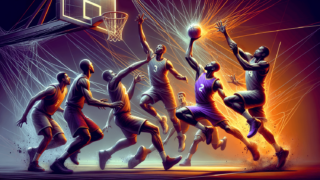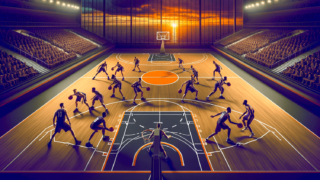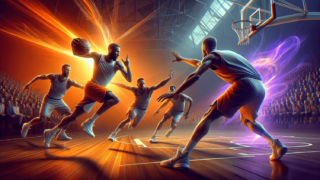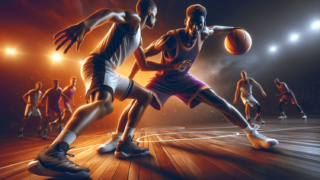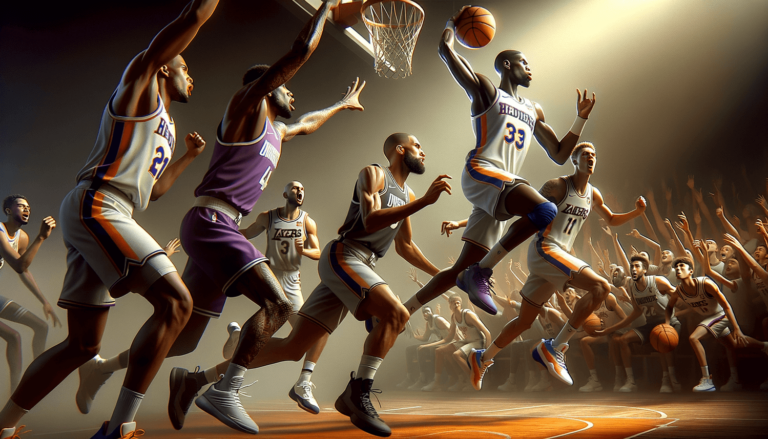
How to Be More Aggressive on the Basketball Court?
Written by: Basketball Universe
Last updated:

Welcome to our latest blog post on how to be more aggressive on the basketball court! When it comes to basketball, assertiveness and intensity can often make the difference between winning and losing. Whether you’re a casual player looking to up your game or an aspiring star striving to stand out from the crowd, being aggressive can propel you to new heights. In this article, we’ll explore practical tips, insights from basketball legends, and the mental aspects of harnessing your inner fire to dominate the competition. So, strap on your sneakers and get ready to unleash your untapped aggression on the court!
How to Be More Aggressive on the Basketball Court?
To be more aggressive on the basketball court, consider implementing these strategies: 1) adopt a competitive mindset by setting personal goals, 2) boost your physicality by focusing on strength training and conditioning exercises, 3) enhance your offensive skills by practicing attacking the basket, 4) improve your defensive skills by learning how to read your opponent’s movements and anticipating plays, 5) develop mental toughness by embracing challenges and overcoming obstacles, and 6) communicate assertively with teammates for better on-court understanding and motivation. These strategies can help you consistently apply an aggressive yet controlled approach to basketball, elevating your performance and increasing your chances of success.
Embrace a Competitive Mindset
Developing a competitive mindset is the first step to being more aggressive on the court. Your mental game is just as crucial as your physical abilities in the world of basketball. Here are some ways to elevate your mental approach:
Set Personal Goals
Create both short-term and long-term goals that will challenge you to improve your skills and make you eager to perform at your peak. Remember to make these goals SMART (Specific, Measurable, Achievable, Relevant, and Time-bound) to keep yourself focused, motivated, and engaged.
Embrace Challenges
Don’t shy away from tough matchups or difficult opponents. Use these opportunities as a chance to learn, grow, and become more resilient. This attitude will make you more assertive and competitive, enhancing your overall performance on the court.
Visualize Success
Visualization is a powerful technique used by many athletes in various sports, including basketball. Visualize yourself executing plays, hitting key shots, and making defensive stops. Engaging your imagination in this way will help sharpen your mental game, making you more aggressive and confident on the court.
Boost Your Physicality
A vital part of being more aggressive on the basketball court is having the physical strength and stamina to outlast your opponents. Integrating strength training and conditioning exercises into your workout routine will enable you to play with more intensity and assertiveness.
Focus On Strength Training
Increasing your strength will give you the edge you need to excel in several aspects of the game, such as rebounding, defending, and driving to the basket. Incorporate exercises such as squats, lunges, deadlifts, and bench presses into your workout regimen to build strong, resilient muscles that can withstand the rigors of the game.
Conditioning is Key
Basketball is a high-intensity sport, and being in excellent shape is absolutely essential to maintaining aggression on the court. Engage in regular cardiovascular exercises like running, sprinting, or cycling, and combine them with agility drills to improve your speed, quickness, and general fitness. A well-conditioned body is more likely to deliver aggressive performances consistently.
Enhance Your Offensive Skills
Aggression on offense can be a game-changer. Whether you’re a guard slashing to the rim or a big man asserting your dominance in the post, honing your offensive skills will give you newfound confidence to make your mark on the court.
Be an Attack-minded Player
By practicing aggressive drives to the basket and working on hitting contested shots, you’ll develop the ability to make an impact in high-pressure situations. Implement one-on-one or two-on-two practice drills, focusing on taking your defender on and finishing strong at the rim, even when faced with robust defensive pressure.
Master the Art of Drawing Fouls
Being able to draw fouls on your opponents can give your team a significant advantage. Not only does it disrupt the rhythm and confidence of your opponents, but it also gives your team opportunities to score with the clock stopped. Learn how to deliberately initiate legitimate contact during your drives, or pump-fake to get your defender off balance before rising for a shot or a layup. Consequently, this can help to put your opponents into foul trouble and increase your free-throw opportunities.
Improve Your Defensive Skills
An aggressive defense can set the tone for your team’s performance and frustrate opposing players. Enhancing your defensive abilities puts you in a more dominant position on the court, and there are a few key areas to consider:
Anticipate Plays
Learning to read your opponent’s movements and anticipate their plays is crucial to becoming a more assertive defender. Watch game footage, understand opponents’ tendencies, and make a conscious effort to predict their next moves during games. This foresight will enable you to be proactive on defense, making it difficult for the opposition to execute their plays.
Master the Art of Steals and Blocks
Steals and blocks are game-changing defensive plays that can swing momentum in your team’s favor. Focus on building lateral quickness and hand-eye coordination to excel in these areas. Practice swiping at the ball during one-on-one or two-on-two drills, and work on your timing and vertical jump for more effective shot-blocking.
Develop Mental Toughness
A large part of being more aggressive on the basketball court comes from your ability to maintain mental toughness under pressure. Your mental fortitude can help you stay committed and “in the zone” during tough moments in a game.
Embrace Pressure Situations
Rather than avoiding high-pressure situations, embrace them and consider them opportunities to prove yourself. By doing so, you’ll develop a stronger competitive edge and become more aggressive, even when the stakes are high.
Trust Your Preparation and Skillset
Believing in your abilities and trusting your preparation is essential for displaying aggressive behavior on the court. Remind yourself of your hard work, your commitment to training, and your drive to improve, and use these motivators to fuel your in-game confidence and aggressiveness.
Communicate Assertively with Teammates
Effective communication with your teammates not only fosters camaraderie but also amplifies aggression on the court. Vocal teammates who are assertive in their communication can inspire their team to follow suit, elevating the entire squad’s collective intensity.
Share Your Knowledge
Offer tips, call out plays, and communicate your observations with your teammates. This information-sharing can lead to better on-court understanding, situational awareness, and decision-making—further enhancing both individual and collective aggression on the court.
Encourage and Motivate
Being a consistent source of motivation for your teammates can make a significant difference in the team’s overall aggression. Offer genuine praise for their achievements and share constructive criticism to help them improve. Ultimately, this will foster a more aggressive and unified team environment that benefits the entire squad.
Put It All Together
By embracing a competitive mindset, boosting your physicality, honing your offensive and defensive skills, developing mental toughness, and communicating assertively with teammates, you possess the tools to be more aggressive on the basketball court. It’s essential to stay committed and continue refining these skills to achieve and maintain an aggressive playing style that will elevate your game and help you stand out in the ever-competitive world of basketball.
Study and Emulate Aggressive Players
One way to pick up on the cues and tactics for increased aggression on the court is to observe and emulate the playing styles of some of the game’s most assertive players. Watching professional basketball, analyzing their moves, and incorporating aspects of their play into your game can be a valuable learning experience.
Identify Your Role Models
Find professional basketball players who display aggression, tenacity, and intensity on the court. If possible, select players who play the same position as you or have similar physical attributes. Some notable examples include Michael Jordan, Kobe Bryant, Russell Westbrook, and Kevin Garnett. Each of these players embodies an aggressive playing style, both offensively and defensively.
Break Down Their Techniques
As you watch these players in action, identify specific techniques or aspects of their game that make them successful on the court. This may include footwork, control of their body, decision making, or even the way they communicate with teammates. Break down their techniques step-by-step and make a note of the elements you want to emulate.
Practice and Implement
Once you’ve analyzed your role models and broken down their techniques, the next step is to incorporate these elements into your game. Be patient and consistent in your practice, as it will take time for these new techniques to become second nature. Keep refining your skills and watch your aggression on the basketball court develop over time.
Develop a Pre-Game Routine
An often-overlooked aspect of in-game performance is having a consistent pre-game routine that prepares you both mentally and physically for the challenges ahead. Developing habits that put you in the right mindset to play an aggressive game can maximize your performance on the court.
Physical Warm-Up
Incorporate dynamic exercises and stretches in your pre-game routine to warm up your body and activate your muscles. Focusing on your hips, shoulders, and legs will help promote a greater range of motion and reduce the risk of injury during the game.
Mental Preparation
Allocate some quiet time before each game to mentally prepare yourself. Engage in visualization, mentally rehearsing your role on the team and your goals for the match. This mental preparation should be focused on the type of aggressive play you aim to demonstrate in the game.
Establish a Ritual
Add a personal ritual or routine that helps increase your comfort level and build self-confidence before playing. It could be listening to specific music, reciting a motivational quote to yourself or engaging in brief meditation. Having a routine you’re comfortable with will help you develop a sense of pre-game stability, which can translate to greater aggression and intensity on the court.
Embrace Continuous Improvement
Becoming more aggressive on the basketball court is an ongoing process. Seeking continuous improvement by staying open to feedback, learning from setbacks, and refining your skillset will help maintain an aggressive edge and elevate your game over time.
Seek Constructive Feedback
Invite coaches, teammates, friends, or family members to give you constructive feedback on your performance, both during practice sessions and games. By embracing their input, you can identify areas where your aggression could be improved and make the necessary adjustments.
Learn From Setbacks
Setbacks are inevitable in basketball. When faced with a challenging situation or a disappointing performance, use it as an opportunity to learn, grow, and become even more aggressive in your next game. Analyze your performance, figure out what went wrong, and make a plan for how to move forward and improve in the future.
Stay Committed to Growth
Remember that becoming a more aggressive basketball player is a journey, not a destination. Consistently work on your physical and mental game, hone your skills, and maintain an open mind to new ideas and approaches. By staying committed to your development, you’ll cultivate an aggressive playing style that can be consistently improved and adapted throughout your basketball journey.
Frequently Asked Questions
In this FAQ section, we’ll answer some common questions and address concerns regarding aggression on the basketball court. These insights should help you better understand the practicalities of adopting an assertive playing style and how it can impact your overall performance.
1. Can being aggressive lead to more fouls or technical fouls?
Aggression does not necessarily equate to foul-prone play. By focusing on controlled aggression, making smart decisions, and avoiding reckless behavior, you can maintain an assertive playing style without incurring an excessive number of fouls or technical fouls.
2. How can I balance aggression with good sportsmanship?
Good sportsmanship involves respecting your opponents, teammates, officials, and the spirit of the game. Being aggressive on the court does not mean you need to sacrifice sportsmanship. Showcase intensity and determination while maintaining a sense of fair play and mutual respect for all participants.
3. Is aggression more important for offensive or defensive players?
Aggression is crucial for both offensive and defensive players. On offense, assertiveness helps in attacking the basket, drawing fouls, and creating opportunities for your team. On defense, aggression can disrupt the opposing team’s plays, generate turnovers, and create energy and momentum that benefit your team.
4. Will aggression help me become a better team player?
Yes, asserting yourself on the court can make you a better team player. An aggressive attitude can inspire and motivate your teammates to push themselves, and effective communication can lead to better on-court understanding and collective strategies. Successfully implementing aggression can also generate more opportunities for your team, fostering a winning environment.
5. Can aggression compensate for a lack of skill or experience?
While aggression can help elevate your game, it is not a substitute for skill or experience. Building your skills and gaining game experience are essential ingredients for sustained success. Aggression, combined with skill and experience, leads to a more competitive and dominant player on the court.
6. How long does it take to become an aggressive basketball player?
Developing an aggressive playing style is a continuous process and will vary for each individual. With consistent practice, dedication to honing your skills, and regular reflection on your progress, you can expect to see meaningful improvements in your aggression and overall performance over time.
7. Should I be aggressive towards my teammates during practice?
Challenging your teammates during practice can help foster an intense and competitive environment that can be beneficial for everyone’s growth. However, it’s essential to find the right balance and avoid unnecessary animosity or conflict that could harm team chemistry.
8. Can being aggressive help overcome height or size disadvantages?
Yes, incorporating an aggressive playing style can help overcome height or size disadvantages. Aggression can compensate for physical disadvantages by enabling you to out-hustle, out-smart, and out-work your opponents in various aspects of the game. Effort, intensity, and quick decision-making can level the playing field for smaller players or those facing larger, more physically imposing opponents.
9. How can I measure my progress in becoming a more aggressive player?
Measuring progress in aggression involves observing both tangible and intangible improvements. Tangible improvements may include increases in steals, blocks, rebounds, and free-throw attempts. Intangible improvements can manifest as increased confidence, more consistent communication with teammates, and a growing sense of leadership on the court.
10. Can aggression lead to better leadership on the court?
Yes, a player who effectively demonstrates aggression on the court can inspire their teammates and guide them towards greater success. By setting the tone with intensity, effort, and assertiveness, you can establish yourself as a leader who motivates and elevates the entire team.
Featured Posts
- No pillar pages found.
